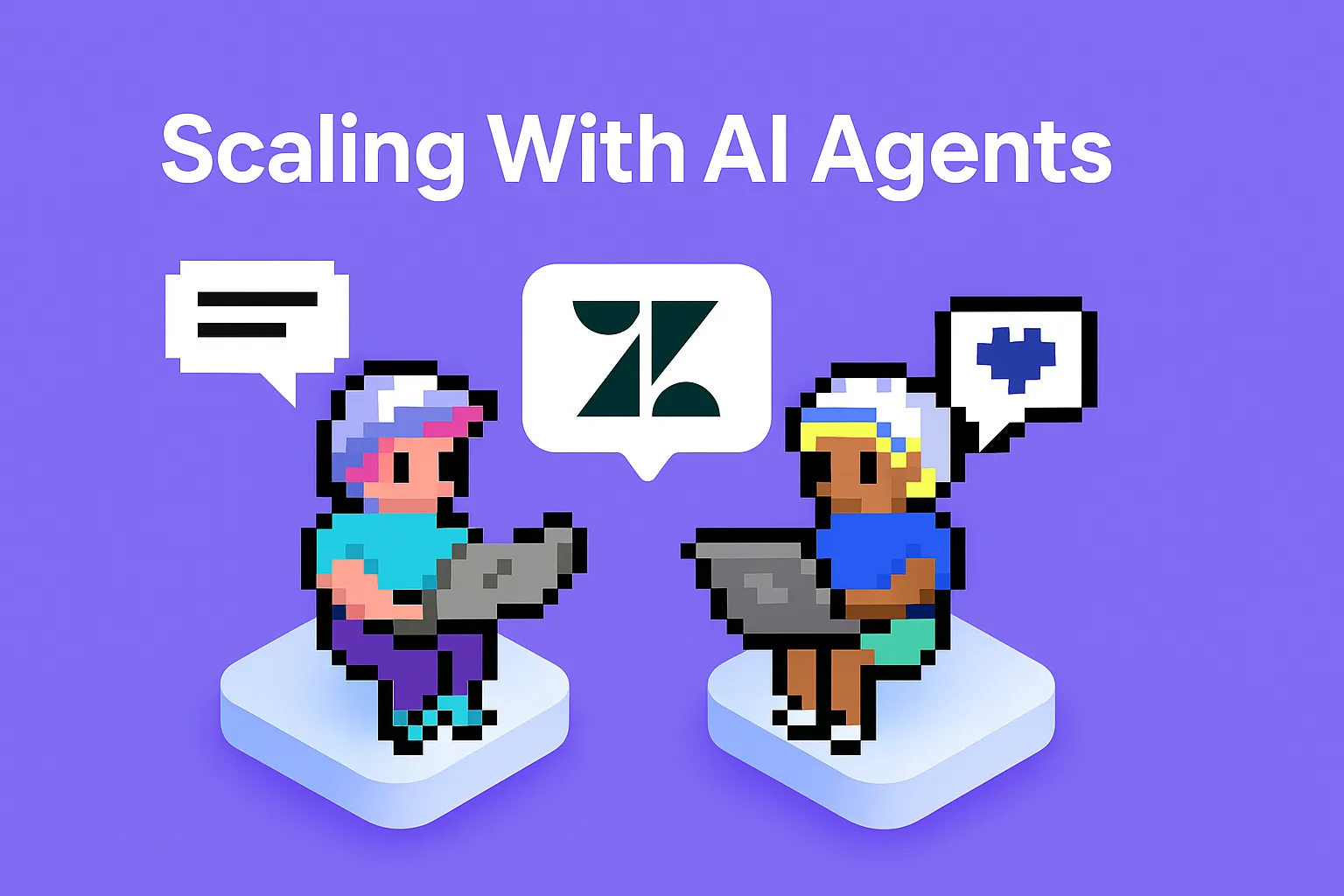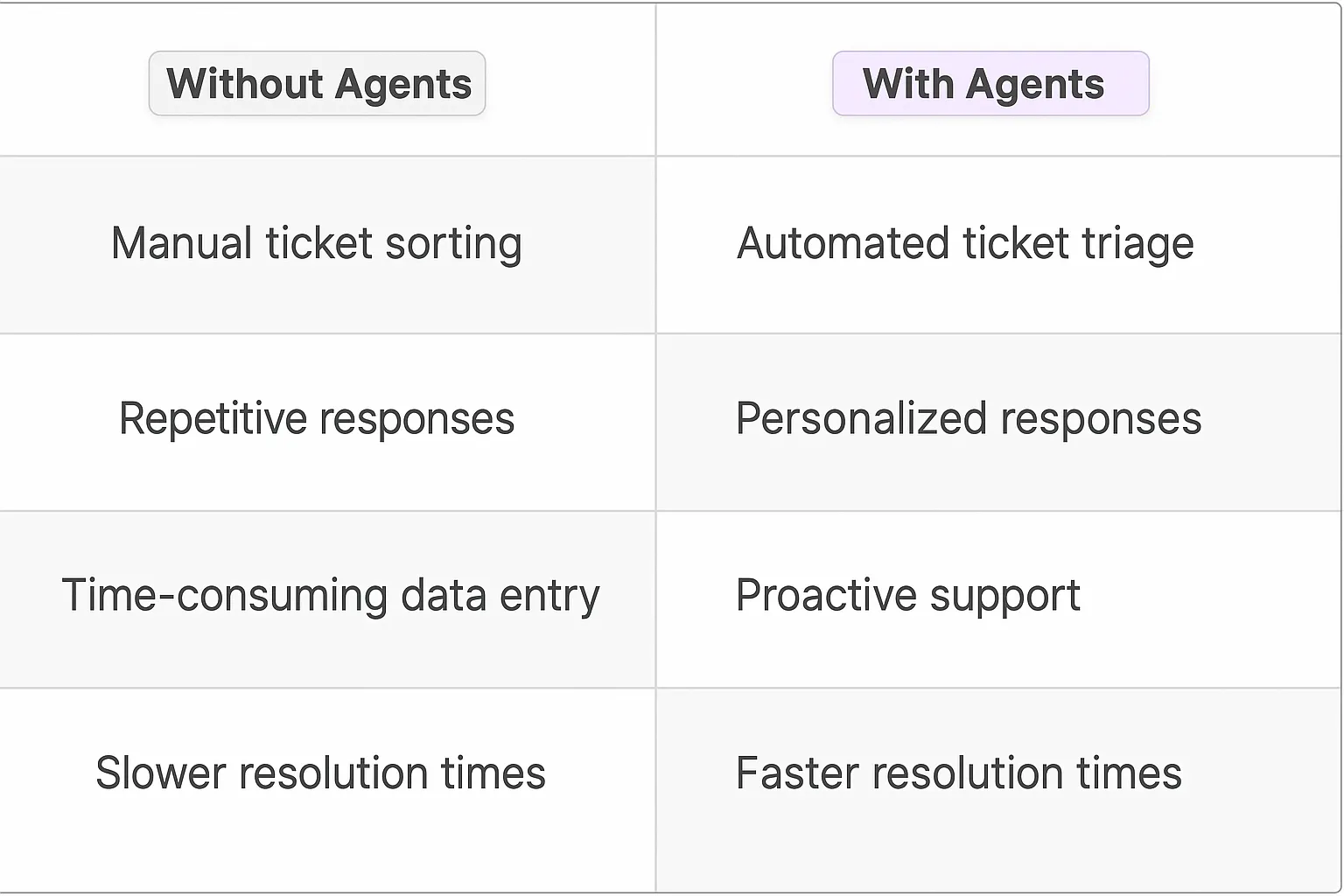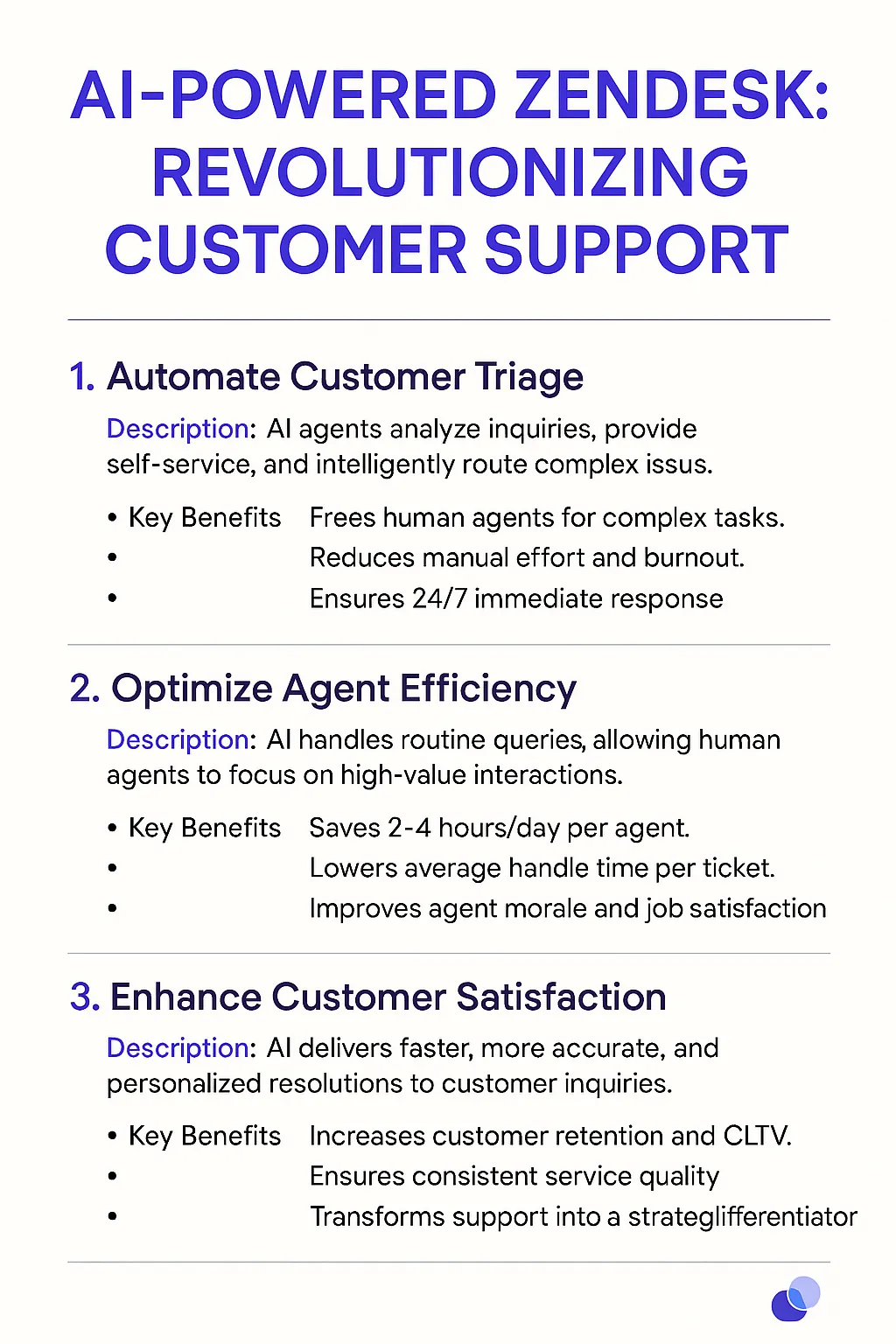Zendesk AI Agents
Understanding Zendesk
Zendesk is a customer service software company that provides a suite of support, sales, and customer engagement tools. It's designed to help businesses improve their customer relationships through better communication, streamlined processes, and data-driven insights. Zendesk's platform is known for its flexibility, scalability, and ability to integrate with various third-party applications and services.
Zendesk offers a comprehensive set of features that cater to diverse customer support needs:1. Omnichannel support: Allows businesses to manage customer interactions across multiple channels like email, chat, phone, and social media.2. Ticketing system: Organizes and tracks customer issues efficiently.3. Knowledge base: Enables creation and management of self-service content.4. Analytics and reporting: Provides insights into support performance and customer satisfaction.5. Customization options: Allows businesses to tailor the platform to their specific needs.6. AI-powered automation: Includes features like Answer Bot for handling routine queries.7. Integration capabilities: Connects with numerous third-party tools and services.These features, combined with AI agents, are transforming how businesses approach customer support, enabling more efficient, personalized, and proactive service delivery.

Benefits of AI Agents for Zendesk
What would have been used before AI Agents?
Before AI agents entered the scene, Zendesk users were stuck in a world of manual ticket sorting, repetitive responses, and time-consuming data entry. Customer service reps spent hours sifting through inquiries, often feeling like they were playing an endless game of whack-a-mole with incoming tickets. The result? Slower response times, inconsistent service quality, and burned-out support teams.
Companies relied heavily on pre-written scripts and decision trees, which often felt robotic and failed to address the nuances of customer issues. It was like trying to solve a Rubik's cube while blindfolded – possible, but incredibly inefficient and frustrating for everyone involved.
What are the benefits of AI Agents?
Enter AI agents for Zendesk, and suddenly we're playing a whole new ball game. These digital teammates are like having a team of super-smart, never-sleeping customer service ninjas at your disposal. They're transforming support operations from a reactive scramble to a proactive, intelligent system.
First off, AI agents are crushing it when it comes to ticket triage. They're like expert bouncers at an exclusive club, instantly assessing each ticket and directing it to the right queue or agent. This means critical issues get fast-tracked, while simpler queries get resolved without human intervention. The result? Dramatically reduced wait times and happier customers who feel heard and valued.
But here's where it gets really interesting: AI agents are learning machines. They're constantly improving their understanding of your product, your customers, and your business. It's like having a team member who's always leveling up, without needing coffee breaks or performance reviews.
These AI agents are also masters of personalization. They can pull from a vast knowledge base and customer history to tailor responses that feel genuinely human and contextually relevant. It's like each customer is getting a bespoke support experience, scaled across thousands of interactions.
Perhaps most importantly, AI agents are freeing up human agents to do what they do best – handle complex, nuanced issues that require empathy and creative problem-solving. It's a perfect symbiosis of human and machine capabilities, creating a support ecosystem that's greater than the sum of its parts.
The bottom line? AI agents in Zendesk are not just incremental improvements – they're game-changers. They're redefining what's possible in customer service platform, turning what was once a cost center into a strategic advantage. In the age of AI, the companies that leverage these tools effectively will be the ones that win customer loyalty and dominate their markets.

Potential Use Cases of AI Agents with Zendesk
Processes
AI agents in Zendesk can transform customer support operations. They're not just fancy chatbots; they're digital teammates that can handle complex workflows and adapt to your company's unique support processes.
One killer use case is ticket triage. An AI agent can analyze incoming tickets, extract key information, and route them to the right department or specialist. This isn't just about keyword matching - we're talking about understanding context, urgency, and even customer sentiment. The result? Your human support team gets to focus on high-value interactions instead of playing ticket ping-pong.
Another game-changing process is knowledge base optimization. AI agents can continuously analyze support conversations and identify gaps in your knowledge base. They can then draft new articles or suggest updates to existing ones, keeping your self-service resources fresh and relevant. This creates a virtuous cycle: better self-service content leads to fewer tickets, which gives your team more time to create even better content.
Tasks
When it comes to specific tasks, AI agents in Zendesk can be absolute workhorses. Let's break down a few high-impact examples:
1. Automated responses: AI agents can craft personalized, context-aware responses to common customer queries. This isn't about canned responses - it's about generating fresh, tailored content for each interaction. The AI can pull from your knowledge base, past interactions, and even real-time data to create responses that feel human and helpful.
2. Data analysis and reporting: Instead of spending hours crunching numbers, your team can ask the AI agent to generate insightful reports. "Show me our top customer pain points this quarter" or "Analyze our response times across different product lines" - these complex queries become simple conversations with your AI teammate.
3. Multilingual support: An AI agent can provide real-time translation and even cultural context, allowing your team to offer truly global support without the need for a massive multilingual staff.
4. Proactive outreach: By analyzing patterns in customer behavior and product usage, AI agents can trigger proactive support messages. Imagine reaching out to a customer with helpful tips right when they're likely to encounter a problem - that's the kind of magic these AI agents can pull off.
The key here is that these AI agents aren't replacing human support staff - they're amplifying their capabilities. They're handling the repetitive, data-heavy tasks that can bog down human agents, freeing up your team to focus on building relationships, solving complex problems, and delivering those moments of delight that turn customers into fans.
As these AI agents evolve, we're going to see a shift in how we think about customer support. It won't be about how quickly you can close tickets - it'll be about how effectively you can leverage AI to create personalized, proactive, and genuinely helpful customer experiences at scale. That's the future of support, and it's closer than you might think.

Industry Use Cases
The versatility of AI agents in Zendesk makes them valuable across various industries. Let's dive into some meaty, industry-specific use cases that showcase how AI can transform workflows and processes. These aren't your run-of-the-mill examples; we're talking about real, tangible impacts that are reshaping how businesses operate.
AI in Zendesk isn't just a fancy add-on. It's becoming the secret sauce for companies looking to level up their customer service game. We're seeing a shift from AI as a novelty to AI as a necessity, especially in high-volume, high-stakes industries where every interaction counts.
What's particularly interesting is how these AI agents are adapting to the unique challenges of each sector. They're not one-size-fits-all solutions, but rather chameleons that morph to fit the specific needs of e-commerce, healthcare, finance, and beyond. This adaptability is what's driving their adoption and, more importantly, their impact.
As we explore these use cases, keep in mind that we're just scratching the surface. The potential for AI in Zendesk is vast, and we're likely to see even more innovative applications emerge as the technology evolves and businesses become more comfortable with integrating AI into their core operations.
E-commerce Customer Support: The Zendesk AI Agent Revolution
Let's talk about e-commerce customer support. It's a beast. High volume, repetitive queries, and customers who expect instant gratification. Enter Zendesk AI Agents - the digital teammates that are about to flip the script on how online retailers handle customer interactions.
These AI-powered agents aren't just glorified chatbots. They're sophisticated systems that can understand context, learn from past interactions, and provide personalized support at scale. For e-commerce businesses, this is a game-changer.
Consider a scenario where a customer is trying to track a delayed package. Traditionally, this might involve multiple touchpoints - checking the order status, contacting the shipping carrier, and relaying information back to the customer. A Zendesk AI Agent can handle this entire process seamlessly. It can access order databases, communicate with shipping APIs, and provide real-time updates to the customer, all while maintaining a conversational tone that doesn't scream "I'm a robot!"
But here's where it gets interesting. These AI agents don't just solve problems; they prevent them. By analyzing patterns in customer queries, they can identify recurring issues and flag them for the product or logistics teams. Maybe there's a confusing step in the checkout process, or a particular product that's frequently arriving damaged. The AI catches these trends before they become full-blown crises.
And let's talk about scalability. During peak seasons like Black Friday or holiday shopping, customer service teams often buckle under the pressure. Zendesk AI Agents can handle thousands of simultaneous conversations without breaking a sweat. They don't need coffee breaks, they don't get frustrated with repetitive questions, and they're available 24/7.
The result? Happier customers who get instant, accurate responses. Reduced workload for human agents, who can focus on complex issues that require empathy and creative problem-solving. And for the business? Lower support costs, higher customer satisfaction scores, and valuable insights that can drive product and service improvements.
This isn't about replacing human agents. It's about creating a symbiotic relationship where AI handles the heavy lifting, and humans step in for those nuanced situations that require a personal touch. It's the kind of efficiency that can turn customer support from a cost center into a competitive advantage.
As e-commerce continues to grow, the businesses that thrive will be those that can scale their customer support without sacrificing quality. Zendesk AI Agents are poised to be the secret weapon in this evolution. They're not just answering questions; they're redefining what's possible in customer service.
Healthcare's AI Transformation: Zendesk Agents in Patient Care
The healthcare industry is ripe for disruption, and Zendesk AI Agents are at the forefront of this transformation. We're not talking about replacing doctors or nurses, but rather augmenting their capabilities and improving patient experiences in ways we couldn't have imagined a decade ago.
Think about the typical patient journey. It's often fragmented, filled with long wait times, repetitive paperwork, and communication gaps. Zendesk AI Agents are stepping in to smooth out these pain points, creating a more cohesive and efficient healthcare experience.
Here's where it gets interesting: these AI agents are becoming the first point of contact for many patients. They're triaging inquiries, scheduling appointments, and even providing initial symptom assessments. But they're not just glorified scheduling assistants. These AI agents are tapping into vast medical databases, learning from each interaction, and providing personalized care recommendations.
For example, a patient with chronic migraines might message the AI agent about a sudden change in their symptoms. The agent, armed with the patient's medical history and the latest research, can quickly assess the situation. It might recommend immediate medical attention or suggest adjustments to the patient's care plan. This rapid, informed response can be crucial in managing chronic conditions and preventing complications.
But the real power of these AI agents lies in their ability to learn and adapt. They're constantly analyzing patterns in patient inquiries and outcomes, identifying trends that human healthcare providers might miss. This could lead to early detection of disease outbreaks or reveal unexpected side effects of new treatments.
Privacy and security are paramount in healthcare, and Zendesk has built these AI agents with HIPAA compliance baked in. They're not just secure; they're meticulous record-keepers, ensuring that every interaction is properly documented and integrated into the patient's medical record.
The impact on healthcare providers is profound. Nurses and doctors, freed from routine administrative tasks, can focus on complex cases and direct patient care. The AI agents handle the initial triage, gather preliminary information, and even suggest potential diagnoses or treatment plans for the healthcare provider to consider.
This isn't just about efficiency; it's about expanding access to healthcare. In areas with doctor shortages, these AI agents can provide a level of care and guidance that was previously unavailable. They're not replacing human healthcare providers, but they're extending their reach and capabilities.
As we look to the future, the potential applications are staggering. Imagine AI agents that can monitor patients with chronic conditions in real-time, alerting healthcare providers to potential issues before they become critical. Or consider how these agents could revolutionize mental health care, providing 24/7 support and early intervention for individuals in crisis.
The healthcare industry is notoriously slow to change, but the integration of Zendesk AI Agents represents a seismic shift. It's not just about answering questions or scheduling appointments. These digital teammates are becoming an integral part of the healthcare ecosystem, improving patient outcomes, reducing costs, and paving the way for a more proactive, personalized approach to medicine.
Considerations and Challenges in Implementing Zendesk AI Agents
Integrating AI agents into Zendesk isn't just a plug-and-play affair. It's a complex dance of technology, strategy, and human factors. Let's dive into the nitty-gritty of what you're really signing up for when you decide to bring these digital teammates into your Zendesk ecosystem.
Technical Hurdles
First off, let's talk tech. Zendesk's API is robust, but it's not a walk in the park. You'll need a dev team that's not just competent, but borderline obsessive about API intricacies. We're talking about people who dream in JSON and wake up reciting OAuth protocols.
Data integration is another beast. Your AI agent is only as good as the data it can access. Siloed information? Legacy systems that don't play nice with others? You're in for a world of pain. Expect to spend significant time on data cleansing, normalization, and creating seamless pipelines.
And let's not forget about scalability. Sure, your AI agent might handle a few hundred queries now, but what happens when you hit Black Friday levels of traffic? You need an infrastructure that can flex without breaking a sweat.
Operational Quagmires
Now, onto the human side of things. Implementing AI agents isn't just a tech problem; it's a people problem. Your support team might view these digital teammates as threats rather than tools. You need a change management strategy that's less "adapt or die" and more "let's augment your superpowers."
Training is another can of worms. Your AI agent needs to learn your brand voice, product nuances, and customer quirks. This isn't a one-and-done deal. It's an ongoing process that requires constant fine-tuning. You'll need dedicated resources for this, or you risk your AI going off the rails.
Metrics and KPIs? They're going to need a complete overhaul. Traditional support metrics like average handle time might become less relevant. You'll need to develop new ways to measure the effectiveness of human-AI collaboration.
The Ethics Minefield
Here's where it gets really tricky. AI agents raise a host of ethical questions. How much decision-making power should they have? What about data privacy? You're not just implementing a tool; you're navigating a moral labyrinth.
Transparency is key. Customers should know when they're talking to an AI. But how do you communicate this without eroding trust? It's a delicate balance that requires careful consideration and probably a few legal consultations.
The Bottom Line
Implementing AI agents in Zendesk is not for the faint of heart. It's a complex undertaking that touches every aspect of your support operations. But for those who can navigate these challenges, the payoff can be enormous. Just remember, you're not just adopting a technology; you're embarking on a transformation journey. Buckle up; it's going to be a wild ride.
The Future of Customer Service: AI Agents and Zendesk
The integration of AI agents with Zendesk marks a pivotal shift in customer service dynamics. This fusion is not just an incremental improvement; it's a paradigm shift that's redefining the boundaries of what's possible in customer service. AI agents are turning Zendesk from a mere ticketing system into an intelligent, proactive support ecosystem. They're handling routine tasks with unprecedented efficiency, freeing up human agents to focus on complex, high-value interactions. This symbiosis between AI and human expertise is creating a new standard for customer service - one that's faster, more personalized, and infinitely scalable.However, this transformation doesn't come without challenges. Implementing AI agents in Zendesk requires navigating technical hurdles, operational changes, and ethical considerations. It's a complex undertaking that demands careful planning, ongoing refinement, and a willingness to rethink traditional support metrics and processes.Despite these challenges, the potential rewards are immense. From e-commerce to healthcare, AI-powered Zendesk is enabling businesses to deliver superior customer experiences, gain valuable insights, and turn their support operations into a strategic advantage.As we look to the future, it's clear that AI agents in Zendesk aren't just a trend - they're becoming a necessity for businesses that want to stay competitive in an increasingly digital, customer-centric world. The companies that successfully navigate this transition will be well-positioned to lead in their respective industries, setting new standards for customer engagement and satisfaction.The journey of integrating AI agents with Zendesk is just beginning, and the possibilities are boundless. It's an exciting time for customer support, and those who embrace this change will be at the forefront of shaping its future.













